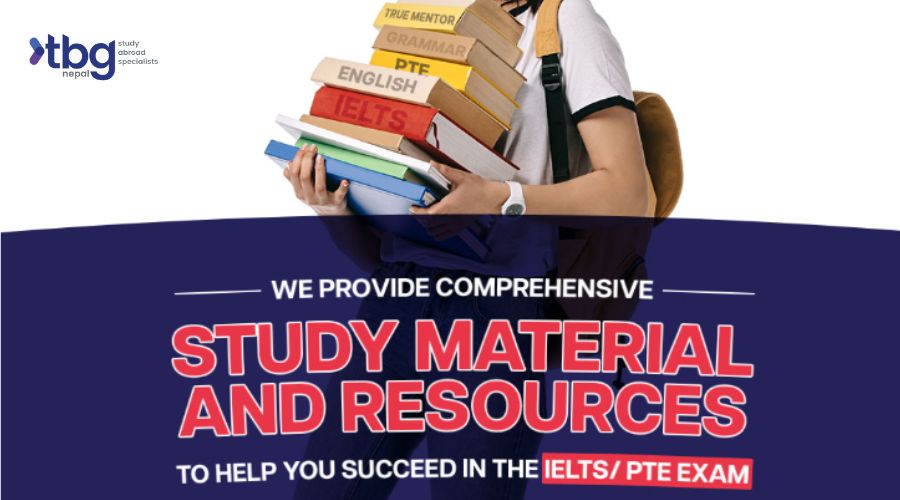
For those preparing for the IELTS exam in 2024, therefore, it’s essential to access up-to-date study materials. The International English Language Testing System (IELTS) assesses the language proficiency of non-native English speakers through a standardized test. It was first introduced in 1980 and has since become one of the most popular English language tests worldwide. Furthermore, universities, employers, immigration authorities, and professional bodies around the world widely recognize and accept it.
Additionally, one of the best ways to prepare for the IELTS exam is to utilize a combination of resources and strategies tailored to your learning style and needs.

IELTS Study Materials 2024
Types of IELTS Tests
There are two main versions of the IELTS test:
1. IELTS Academic:
If you’re thinking about studying abroad or starting your career in another country, the IELTS Academic Test is perfect for you. Therefore, it caters to those seeking admission to international universities for undergraduate or postgraduate studies. Furthermore, this test is specially tailored to assess your English skills if you intend to pursue higher education in an English-speaking country.
2. IELTS General Training:
The IELTS General Training exam is ideal for those aiming for educational programs below the degree level. Therefore, it’s also useful for work-related goals or employment training. Furthermore, this test evaluates practical English language abilities needed for daily communication in both social and professional settings.
How long does the IELTS exam take?
Therefore, the total exam time is 2 hours and 45 minutes whichever IELTS test format you take:
Writing: 60 minutes – 2 tasks.
Listening: 30 minutes – 40 questions.
Reading: 60 minutes – 40 questions.
Speaking: 11 to14 minutes – three-part conversation with an examiner.

IELTS Test Format
IELTS Test Format – The Details
Writing
Timing – 60 minutes
IELTS Test Format – You can choose to take either the Academic or the General Training test. Thus, the only difference between the two lies in the test materials and the language type you employ in your answers.
The IETLS test format for Writing has two parts – Task 1 and Task 2.
Similarly, you must write a minimum of 150 words for Task 1 and a minimum of 250 words for Task 2.
Academic Writing
Task 1 – You will encounter a graph, table, chart, or diagram. In addition, you must describe, summarize, or explain the information in your own words. For example, you might be asked to:
- describe and explain data
- describe the stages of a process
- describe how something works
- describe an object or event
Task 2 – You will need to write an essay on a topic of general interest. Furthermore, your essay will respond to a specific point of view, problem, or argument stated in the question.
As a result, you should write your response to both tasks in a formal style.
General Training Writing
Therefore, both writing tasks in the General Training test are based on topics of general interest.
Task 1 – You will need to write a letter requesting information or explaining the situation in relation to a specific circumstance. Thus, the letter may be written in a personal or semi-formal style, as appropriate to the situation.
Task 2 – You will need to write an essay on a topic of general interest.Then, your essay will respond to a specific point of view, problem, or argument stated in the question.
You may use a more personal style than would be required in the Academic Writing Task 2 essay.
Skills Assessed
The Writing test is designed to assess your ability in the following aspects:
- content
- organisation of ideas
- accuracy and range of vocabulary and grammar
Below are the assessment criteria for each IELTS test format. As a result, the criteria for any specific essay will depend on the type of task you are asked to complete.
Marking
The overall assessment criteria for IELTS Writing, stated on the official website, are:
- Task Achievement (i.e. appropriate response to the task)
- Coherence and Cohesion (i.e. ability to present a well-structured essay)
- Lexical Resource (i.e. ability to use vocabulary correctly and to use a range of appropriate vocabulary)
- Grammatical Range and Accuracy (i.e. ability to use grammar correctly and to use a range of grammar forms)
Reading
Timing – 60 minutes
IELTS Test Format – There are two versions of the Reading test – Academic and General Training. Moreover, the difference is in the length and type of the texts. Similarly, the IELTS test format for both versions is made up of three parts.
There are 40 questions in the test. As a result, you will encounter a variety of different types of questions to test a wide range of reading skills. Thus, the tasks will be selected from this list:
- multiple choice
- identifying information
- identifying a writer’s views/claims
- matching information
- matching headings
- matching features
- matching sentence endings
- sentence completion
- summary completion
- note completion
- table completion
- flow-chart completion,
- diagram label completion
- short-answer questions
Academic Reading
Moreover, the three sections each contain one long text taken from real books, newspapers, magazines or journals. On the other hand, the texts will be of general interest and may contain diagrams, illustrations or graphs. Also, a glossary will be provided if the text contains technical terms.
General Training Reading
Section 1 – two or three short factual texts related to everyday life (e.g. hotel evacuation procedure, a series of related advertisements, a course outline).
Section 2 – two short factual texts related to work (e.g. job description, staff training, disciplinary procedures).
Section 3 – one longer text of greater complexity (e.g. general interest texts from books, newspapers, magazines, company brochures or handbooks).
Skills Assessed
The Reading test is designed to assess your ability to:
- read for gist
- read for main ideas
- read for detail
- understand inferences and implied meaning
- recognise writer’s opinions, attitudes and purpose
- follow the development of an argument
Marking
Each correct answer is awarded 1 mark. Then, your score out of 40 is converted to the corresponding IELTS band scale level.
Listening
Timing – 30 minutes (plus 10 minutes to transfer the answers to your answer sheet)
IELTS Test Format – The IETLS test format for Listening is made up of four sections. In each section, you will listen to a recorded text and then answer a series of question on it.
The text will be played only once. Over the course of the test, you will hear a variety of voices and native-speaker accents.
Furthermore, there are 40 questions in the test. Then, you will be asked a variety of different types of questions selected from this list:
- Matching
- Multiple choice
- Note completion
- Form completion
- Table completion
- Sentence completion
- Summary completion
- Flow-chart completion
- Short-answer questions
- Plan/map/diagram labelling
The 4 Sections
Section 1 – A conversation between two people set in an everyday social context (e.g. booking tickets to the theatre).
Section 2 – A monologue set in an everyday social context (e.g. a welcome talk for new college students).
Section 3 – A conversation between up to four people set in an educational or training context (e.g. a group of students discussing a university assignment).
Section 4 – A monologue on an academic subject (e.g. a lecture on wildlife).
You will have time to look at material relevant to the test before the recordings start and to read the questions that you will be asked.
Skills Assessed
Likewise, the Listening test is designed to assess your ability to:
- understand main ideas
- understand detailed factual information
- recognise the opinions and attitudes of speakers
- recognise the purpose of the communication
- follow the development of ideas or arguments
Marking
Each correct answer earns 1 mark. Your score out of 40 is then converted to the corresponding IELTS band scale level.
Speaking
Timing – 11-14 minutes
IELTS Test Format – The IELT test format for Speaking is comprised of three parts.
Part 1 – Introduction and interview (4-5 minutes)
The examiner will ask you general questions about yourself and your life, e.g. your home, family, interests, work /studies.
Part 2 – Individual speaking (3-4 minutes)
The examiner will give you a card with a topic written on it.Then, you will be asked to speak on this topic for 1-2 minutes. The examiner may ask you one or two questions about your topic.
You have one minute to prepare, during which you can take notes.
It’s impossible to predict the type of question you’ll be asked because the range of potential topics is vast.
Thus, here are a few real examples to illustrate this:
- Your dream job.
- Your favourite subject in school.
- An unusual meal you’ve had.
- A situation where you had to be polite.
- An event or celebration you attended.
- An occasion a visitor came to your house.
- Work you got positive feedback for.
- An activity for healthy living.
- An exciting book.
- Recent development in your town.
- A journey you took recently.
- A favourite childhood toy.
Part 3 – Two-way discussion (4-5 minutes)
The examiner will ask you more questions about your Part 2 topic leading to a two-way discussion on the subject. As a result, it will give you the opportunity to show a greater range of speaking skills.
Skills Assessed
We design the Speaking test to assess your ability to:
- communicate opinions and information on everyday topics and common experiences and situations
- speak at length on a given topic using appropriate language and organising ideas coherently
- express and justify opinions and to analyse, discuss and speculate about issues
Marking
The overall assessment criteria for IELTS Speaking, stated on the official website, are:
- Fluency and Coherence
- Lexical Resource
- Grammatical Range and Accuracy
- Pronunciation
Moreover, the examiner will assess your speaking skills and give you a score on the IELTS band scale. Thus, we record all tests.
How to register for IELTS Exam?
To register for the IELTS test, you can follow these straightforward steps:
- Initially, locate an authorized IELTS test center near you.
- Select a suitable test date from the provided choices.
- Proceed to complete the registration process either online or in person, where you will provide your personal information and specify the type of test (Academic or General Training).
- Then, make the necessary payment for the test fee, after which you will receive a confirmation email containing your test details.
- Then after, prepare for the test by acquainting yourself with the format and practicing with sample questions.
- Finally, on the day of the test, ensure to arrive promptly at the assigned test center with your identification document.
IELTS Band Scores
| Band Score | Level of Proficiency |
|---|---|
| 9 | Expert user |
| 8 | Very good user |
| 7 | Good user |
| 5 | Modest user |
| 4 | Limited user |
| 2 | Intermittent user |
| 1 | Non-user |
| 0 | Did not attempt the test |
IELTS Preparation Classes in Kathmandu, Nepal
If you’re considering taking the IELTS Test in Kathmandu, make sure to stop by our center! We’re offering special deals tailored just for you. Therefore, take advantage of these offers and receive the assistance you require to excel in your IELTS preparations. Moreover, we specifically designed our IELTS study materials for 2024 to help you succeed. Also, don’t miss out on this opportunity to boost your scores and achieve your goals. Likewise, explore our IELTS preparation classes in Nepal today!
Thus, visit us at TBG Nepal Education Consultancy, located in Kamaladi, Kathmandu.
« Best Way to Prepare for IELTS Exam – IELTS Preparation

